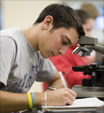 From its earliest days, the College of the Holy Cross has been a leader in undergraduate science education. In the laboratories and classrooms on Mount St. James, thousands of young men and women began their exceptional careers in science, medicine, and social science.
From its earliest days, the College of the Holy Cross has been a leader in undergraduate science education. In the laboratories and classrooms on Mount St. James, thousands of young men and women began their exceptional careers in science, medicine, and social science.
They have applied their lessons in biology, chemistry, physics, psychology, computer science, mathematics, and environmental studies — bringing new perspectives and skills to their chosen work and service. Always dedicated to close student-faculty interaction, Holy Cross has set national standards in its science teaching and collaborative research.
Today, the College is proud to offer students unique opportunities to publish their findings and speak at prestigious national conferences. In our increasingly interdependent world — where advances are taking place every day in the interdisciplinary cognitive sciences, biochemistry, neuroscience, environmental science, and other fields — excellence in the sciences has never been more important for Holy Cross and its mission. Informed by the Jesuit teaching of “Magis” — always striving for greater things — the College is committed to bringing its legacy of leadership in science teaching to a new era.
Holy Cross’ commitment to science education extends beyond the campus classrooms and labs and into the neighborhoods, schools and community-based programs in Worcester. For more than two decades, Holy Cross has offered intensive science education programs for Worcester Public School teachers and students. Students from the Nativity School of Worcester benefit from regular interaction with Holy Cross science students and faculty. In addition, the College has well-established research partnerships with Worcester organizations such as the Regional Environmental Council, the EcoTarium, and the Blackstone River Coalition. The College hosts the offices of the Blackstone River Coalition and is in the process of establishing the Blackstone Collaboratory, which will be a collaboration of regional natural scientists, mathematicians, historians and economists.

